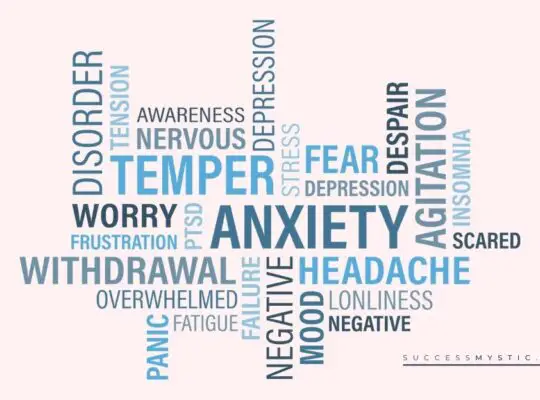When it comes to getting what you want in life and learning to be happy, the most crucial first step that you can make is to determine your priorities.
And once you are on your path to realizing your goals, being able to maintain perspective will help you stay the course and continue to work hard to achieve your dreams. But how do you develop the skills necessary to do these two important jobs?
Setting priorities and learning to maintain perspective are essential life tasks. They are not necessarily taught to you by your parents or in school, so they are tasks you often must learn on your own, sometimes through trial and error.
But why not take a systematic approach to these and learn how to do them well? To help you with that, we have created this definitive guide to learning to set priorities and maintain perspective in your life.
Why Identifying Your Priorities is Vital to Your Happiness
Whatever you prioritize will be the guiding force in your life. When you prioritize others or things that are not contributing to your personal goals and dreams, you will lead a life of unhappiness and discontent. Knowing your top priorities in life can help you in many ways. Here are the top six reasons you need priorities in your life.
Priorities Give You Direction and Purpose
Without priorities in your life, you have no guiding force to direct your actions and help you live with purpose. While living without priorities may sound fun and carefree, it actually means you have no goals. And without goals, what is the reason to get out of bed every day and participate in life?
Priorities are what guide your choices, help you determine what to do and what not to do. Without them, your life is apt to be aimless without meaning. Over time this can leave you feeling unfulfilled and dissatisfied.
Priorities Help You Manage Your Time
When you know what is essential to you, you can decide what is worthy of your time and what is not. When you lack priorities, everything becomes important, and over time, this can lead you to feeling frazzled, stressed, and eventually burned out.
Chasing others’ priorities or simply focusing on everything all at one time means that you never quite know which things to do and which to let go, and your ability to manage your time will suffer immensely.
Priorities Allow You to Live by Your Values
When you live life for your own priorities, you are honoring those values, beliefs, and principles that are most important to you. Your main concerns are manifestations of what is important to you, and they become goals that you can realize that are founded in your core beliefs.
Without priorities, you could end up living life and making choices that conflict with what you believe, and over time, this leads to feelings of sadness, loneliness, and hopelessness. Learning to honor your values by establishing priorities is an essential tenant of mental and emotional health and well-being.
Priorities Give You Direction for Your Choices
Once you establish clear priorities in your life, you then have valuable criteria to guide your choices. And these assessment tools are based on what is important to you, not what matters to others.
Priorities can enable you to eliminate those things in your life that are not contributing to your happiness, can help you to filter your options, and can advise you in your decision-making process. With clear priorities, your path forward becomes open and visible, and you can then make the best decisions that will provide you with the most favorable outcomes.
Priorities Help You Grow and Reach Your Potential
When you have a clear direction and goals that are important to you in your life, you are willing to work for them and to do whatever it takes to realize your dreams. Learning and growth are a vital part of the process that occurs when you are trying to achieve something important to you.
Priorities help you identify what you want and what is worth working hard for, and once you are on the path to attaining your dreams, you will be more likely to learn from the opportunities that present themselves. Having priorities helps you to identify those things that are worth fighting for and which will stretch you in new ways.
Priorities Make Life Exciting and Interesting
When you live life to focus on your priorities, every day is a new adventure and opportunity, and you are excited to wake up and get started with your day.
Priorities help you feel motivated and passionate about the potential of life, and you will be more likely to feel more optimistic about the opportunities you have in your daily life. Having priorities can transform challenges into exciting opportunities, too.
How to Set Priorities for Your Life
Learning to focus on what is relevant and meaningful to you versus those that others want you to THINK are urgent or important is an essential part of living life on your own terms. Your priorities are what enable you to have personal choice and exercise your power over your life.
By learning to clarify and set your own significances, you are choosing to live life on your own terms and fulfill your values every day. Where do you start, though? And how exactly should you figure out what is essential in your life? Here is a step-by-step guide for setting your priorities.
Step 1. Identify Your Values
Before you can figure out what the guiding goals of your life are, you must first spend some time getting to know your values. Exploring the beliefs, principles, and values that guide your life is vital because these underlying ideals are what inform everything you do and all that you want in your life.
Getting to know your values will help ensure that whatever goals you pick for yourself are aligned and will ultimately bring you joy. Your priorities should be things that you believe in and stand for, so it is worth it to spend the time clarifying these for yourself.
Step 2. Think About What is Most Important to You
Take some time away with yourself to really ponder this question. You may need more than a few hours to contemplate this question thoroughly. What is it that is most important for you to accomplish or be in your life?
What do you hope people remember about you after you are gone?
What type of legacy would you like to leave behind? What are the most critical areas for concern and concentration in your life right now?
Contemplate your answers to these questions. Write down what you are thinking and how you are feeling.
Make a list of all the things in your life that are important to you, the things that, without which, you would be unhappy or unhealthy. Do not worry about whether you have attained these things yet or if they are currently within your grasp.
Your focus can include how you would like to CHANGE certain existing elements in your life, IMPROVE areas that are kind of working but could definitely be better, or how you would like to MAINTAIN something that brings you joy and is already working well.
As you are making your list, consider the difference between urgent and important. Important things are meaningful, urgent things are just those that need to be done.
Your list of critical things should not be longer than about five goals. If there are more, ask yourself which of these will bring you peace and happiness in the next ten years?
Step 3. Narrow Your Focus to Three Areas
Because you cannot expect to accomplish all your goals at once, you must determine a starting place for realizing these crucial dreams that you have identified.
While it is best to focus on one area at a time, you can reasonably attend to at least areas of your life over an extended period, such as a year. So, to help you identify your priorities for the coming twelve months, you will narrow your list from Step 2 into three areas of focus.
Consider all the various aspects of well-being. These include your social, emotional, spiritual, environmental, occupational, financial, intellectual, and physical wellbeing.
Look back at the list you made in Step 2. Choose the top two or three areas that you feel are most urgent for you to focus on or where you think you could lay a foundation for future goals. Write down these three goals. These will be your driving force for the coming year and will guide your decisions and your actions.
Step 4. Audit Your Activities
For an entire week, write down everything that you do. Start from the time you wake up each morning to when you lay down at night. After you have audited all your activities and how much time you spend doing them, look at the full list and mark each that is in line with your priorities and values that you previously identified.
Those things that you are already doing to contribute to your priorities are important to maintain. Next, look at your list to see if there are changes you can make that will help incorporate more of your values and priorities.
For example, if your priority is to improve your health this year, then where can you make minor adjustments that move you toward that focus? Can you walk to work more often? Can you spend a few hours on the weekend cooking more healthy meals for the week?
This type of audit shows you where you are spending time on things that are not important to you, as well. Look for activities that you are doing that conflict with your goals or values. These should be eliminated or changed.
Step 5. Test it Out
When identifying your priorities, you may not always nail it on the first attempt. After you have audited your habits and activities and chosen to change your daily habits and routines, try out your new focus for a bit. Live intentionally for one week with your new priorities at the front of your mind. Make changes to your schedule and routines. Begin taking steps toward achieving your goals.
At the end of your trial period, take some time to reflect. Does it feel like you are moving in the right direction? If you continue on this path, will you be happy with your choices a year from now? Five years from now?
You may need to make some adjustments to your priorities, to perhaps start in a different direction once you see what it takes to maintain focus. It is okay to change your mind once you get going. Just be sure you are doing it for the right reasons and that your choices, whatever they are, align with the values you identified in Step 1.
Other Tips for Living to Support Your Priorities
Identifying your priorities is the first step to making them a part of your life. If you want to live a life that supports those goals, though, there are some other habits and tools that you will need. Here are just a few of those that can help you bring your priorities to fruition in your life.
- Watch your thoughts. Your mindset controls your actions and your reality. You become your thoughts. Learning to monitor and manage your attitude is an integral part of manifesting your priorities. You must have a positive outlook and believe in your ability to accomplish your goals. When you understand these things, you will attract people, resources, and opportunities to your life that will contribute to you being able to accomplish your goals.
- You need to declutter your life. Clutter includes possessions, activities, people, and thoughts that take away from your ability to focus on what is important. Decluttering should include getting rid of anything in your life that detracts from your priorities. Delegate what you can. Cut out obligations that are no longer important to you. Cut back on activities that waste your time or take away from time spent on what is essential. Stop spending time with people who bring you down.
- Focus on what is positive and good in your life. Practice gratitude every day, which will help you to enjoy and appreciate your life more. Be grateful for everything that is bringing you closer to your priorities and express that gratitude with your words and actions. Focus on what you have, not what is missing, and you realize how much you have that makes your life full and happy.
- Remember that change takes time, so be patient. When you finally focus on what is important to you, it can make you impatient to finally realize your dreams. Remember that it is a process and that you must enjoy the journey as much as the results. Be happy that you have made the leap toward focusing on your priorities and be content that you are doing all that you can to help you realize your dreams.
Learning to Maintain Perspective
Figuring out your priorities and translating those into goals for your life is crucial. But the real work of putting those dreams into action takes time, effort, and persistence.
And throughout that meaningful journey, you will require the ability to maintain perspective. And when you have perspective, you can place your goals and their importance within the framework of your life, your other responsibilities, and your values.
Having perspective means knowing which value or ideal you are focused on or need to attend to at any moment. The closer you are to a situation emotionally or psychologically, the more likely you are to be influenced by your values and beliefs. And the more important something is to you, the harder it is to see a broader perspective about it.
Being able to see the forest as well as the trees, that is seeing the details as well as the goal’s more significant place in your life, is a critical balancing act that will help you to attain whatever you are trying to achieve. How do you enhance your perspective, though, and how does having it help you reach your goals? Here are a few important reminders about maintaining perspective.
1| Life is About Learning
For every challenge or obstacle you face, you have two choices to make. Do you allow this setback to define you, or do you learn from the experience and apply it to improve your life? Any time you experience something unexpected or negative in life (or even positive things, for that matter), you should be learning from those experiences. You should then apply those lessons to your future efforts and goals.
When things do not go as you expected, when your dreams fail, or when you realize that something is unattainable for you, that does not mean you should quit. It means that you have learned some valuable skills and insights into yourself, and you are now better equipped to handle problems in the future. It is all in your perspective on the matter. You can see it as defeat, or you can see it as a learning experience. It is your choice.
2| Always Question Your Choices and Actions
When you are struggling to gain perspective on a situation or experience, it may be necessary to question your choices and actions that led to this point. Examining your own beliefs and potential biases that are contributing to your challenge, carefully assessing your personal decisions, and questioning your actions and reactions to others and the world can help clarify your problem.
Any time you are struggling with putting things into perspective, it’s time to ask yourself how you feel, what has contributed to this current reality, why you act and react as you do, and if any of your beliefs or skills are hindering you from realizing your goal.
3| Remember Your “Why”
When you find that things are feeling difficult or you have lost perspective in your life, it is important to return to those priorities, to remember why you are doing what you are doing. Growth is only possible when you are willing to grow, change, and possible sacrifice to achieve something important to you. And remembering why that thing is important and focusing on the meaning of that priority in your life is necessary.
Sometimes, you may find that the reason you have lost perspective or motivation is that the goal no longer holds the same importance for you. You may feel differently about your priorities after time has passed. That’s ok. That is a learning opportunity, too. That means you need to reevaluate and reprioritize to gain a new perspective for yourself.
4| Accept That You Cannot Control Everything
When trying to get perspective on a goal or situation, it can be easy to focus on those things that you can’t control or change. But you will gain greater perspective and find more peace when you learn to accept that there are a lot of things you can’t control or change in this world, including other people.
Worrying about those things will make you crazy and cloud your judgment but learning to accept them opens up your perspective to focus on all those things over which you do have control. Learning to accept and move on from the uncontrollable or unchangeable is an integral part of maintaining a healthy perspective.
5| Take Some Time to Evaluate Your Perspectives from Time to Time
If you want to really be honest with yourself and work on developing healthier ways of seeing things, then you need to get clear about where you stand and how your values are influencing how you see things. Consider all your perspectives about life, yourself, other people, those like you, and those different from you.
What are your beliefs? And how do these beliefs shape you, your interactions with others, and your choices and actions? Does your view on something affect how you treat others, how you react to specific situations, how you evaluate your own choices?
Spending some time focusing on these beliefs and their influence can help you see where your perspectives may be helping or hindering your ability to realize your priorities.
6| Stop Comparing Yourself to Others
Often, our perspectives of ourselves, our lives, and our ability to attain our goals is clouded by how we compare ourselves to other people. When you allow your thoughts or assessments of others’ lives, skills, looks, happiness, or lifestyle to influence your evaluation of yourself, you are doing yourself and the other person a disservice. You are not other people. You have different values, needs, personalities, talents, and relationships.
You cannot possibly be made happy by what others have because you are a unique person that has different priorities. Letting go of comparisons will enable you to set expectations for yourself that are in line with your own values and priorities, not someone else’s.
And when you stop comparing yourself to other people, you can finally have a perspective that is focused where it should be, which is on what is important to you.
7| Gain Perceptive from Others
When you are struggling with your perspective on a problem or how to proceed with your priorities, it can sometimes help to talk with others. Those who are not so closely tied to the situation or outcome may be able to see a broader view or may have different ideas about your situation.
And those with other experiences than you may have knowledge or background that could be of benefit to helping you. Differing perspectives are often constructive, but you must be open to hearing and considering them.
8| Place the Situation in Context
When you are struggling or dealing with a challenge or even when you are mired down in the day-to-day activities that are necessary for achieving a goal, it can sometimes feel like that is all you think about.
When faced when these emotions, ask yourself, how important is this, really? Is this decision or situation going to matter in two weeks? How about in two months?
Only those that will matter in the long run should be occupying that much space in your mind and your heart. Everything else is just noise and does not deserve that much worry.
The other part of placing things into context is to consider if your current situation is temporary or permanent. If you are struggling right now, will you always be challenged? Just because things are not going as you had hoped today does not mean this is going to continue to be this way forever. Focus on the positives that lie ahead, and the rest will take care of itself.
Final Thoughts
Making the most of your life and learning to enjoy it to its fullest means learning to live on your own terms. This requires that you know what you want and what is important to you.
Setting priorities for yourself enhances your mental and emotional well-being and provides you with direction. And being able to maintain perspective while working toward your goals will help you to succeed in reaching your aims.
Figuring out what matters to you may take some time, and your priorities will shift over time, as well. What you wanted five years ago is likely different than what you want now, right?
So be sure your priority assessment work is ongoing and that you revisit your goals and perspective frequently. The closer attention you pay to these two aspects of your life, the more happiness, success, and contentment you will enjoy.







